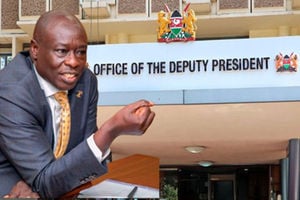Move over teachers, students in charge

The council of elders of Nyahururu High School (from left standing) Tony Maina, Samuel Kimani, Kevin Macharia, Kenneth Njenga, Isaac Waithaka, Joram Munoru, Duncan Njoroge, Duncan Munene, George Gikonyo. Photo/JOSEPH KURIA
What you need to know:
- Democracy comes to schools as students now have bigger role in administration
At only 18, Duncan Njoroge is one of the few Kenyans called an elder.
He is the proudly elected chairman of a council of elders, whose mandate includes resolving conflicts and counselling his peers at Nyahururu Boys High School in Nyandarua.
It is a huge burden on his young shoulders, but one he seems to revel in as a recent case of a stolen pair of trousers that threatened to blow up into a full riot in the school indicated.
“We spent a better part of last night solving a case of a stolen pair of long trousers,” he told Saturday Nation recently.
A form two student, accused of stealing the pair of trousers, had been on the verge of being lynched by fellow students. The boy sought the council of elders’ intervention, who summoned the parties involved.
Such is the amount of respect weilded by the ‘elders’ that the summons are obeyed; the school principal even let them use his office.
It turned out that the offending pair of trousers had been stolen by a different student, who sold it to the “accused”.
After listening to both sides, Njoroge and his team gave their verdict: The pair of trouser had to revert back to its owner, the student who allegedly stole it and then sold it had to refund the money to the buyer.
The ‘thief’ had to also surrender to the school principal for punishment, and undergo compulsory counselling to mend his thieving ways. Once passed, Njoroge and his team of ‘elders’ handed in their verdict to the school principal, and to the rest of the school.
Their decision was final; and everyone in the school-from the students to members of staff - knew this. And with the verdict so passed, a case that would have easily blown into a violent confrontation between the students was speedily and efficiently laid to rest.
This is just one of the many instances where teachers are empowering their students to help run the school.
The Nyahururu school system, a brainchild of the United Nations Children’s Fund and the ministry of Education, was mooted in 2006 after a survey revealed that students played little or no role in school management.
The system, being adopted by schools countrywide, aims to cede some of the school administration powers to elected student leaders.
The study found out that student participation in the daily running of the school was directly linked to academic performance and school strikes. Two years later, the country registered the highest number of high schools strikes which affected over 800 schools countrywide.
The ministry and Unicef began training head teachers and students in forming democratically elected student councils at school, district and national levels.
One region that has so far recorded successful high school student governments is central Kenya. Here, elected student leaders have become a vital link between the student-body and the school administration.
The student leaders job description range from resolving interclass conflicts, determining dining hall menus and even ensuring that teachers do not miss lessons. Some even set examinations for their respective classes!
At Magumu high School, near Naivasha, students elect a student administrative council every year.
The elections are a purely student affair - the school administration only sets up election guidelines, and acts as returning officer in the elections.
And according to the school principal, Mr. Peter Kariuki, the system is working: “Before its inception, students would riot at least once a year. There has been no case of student unrest in the last three years,” says Mr. Kariuki.
Kianyaga Boys in Kirinyaga encourages students to run their own examinations body.
Working side by side with an already established school testing system, the students set, administer and mark weekly tests on selected subject topics.
In other schools, elected student representatives select school menus — a common trigger for student unrest. At Moi Equator Girls in Laikipia, the student government proposed radical changes to the school menu.
At Kanjuri High in Nyeri, students elect a student welfare council annually. Among other tasks, the council is mandated to Identify students who need financial assistance, and find ways of raising money to keep them in school.
“In the last three years, the students have paid school fees for four students, through the welfare councils,” says the school principal, Mr. Elijah Nguyo.
Other areas where students elect their own leaders through popular vote include games, clubs and counselling.
But the secondary school student governments have had their own low moments. According to the region’s ministry of Education officials, the flip side of elected secondary school student governments is that they can easily breed chaos in schools.
Cases of student councils that become so powerful they literally attempt a coup against school administrations abound. According to the area Provincial director of education, Mr. Patrick Nyagosia, one student council in a leading school, which he declined to name, charged illegal levies amongst the students.
Besides collecting thousands of shillings, the student leaders also demanded exclusive treatment from the school administration, including being allowed to carry mobile phones to class and special diets in the dining hall.
School principals say such incidents, though rare, are clear demonstration that ceding too much power to high school students is a double-edged sword.
“We must keep mentoring student leaders, otherwise we will end up with chaos,” said Ms Lucy Gitau, the principal of Gathirimu Girls in Kiambu.




